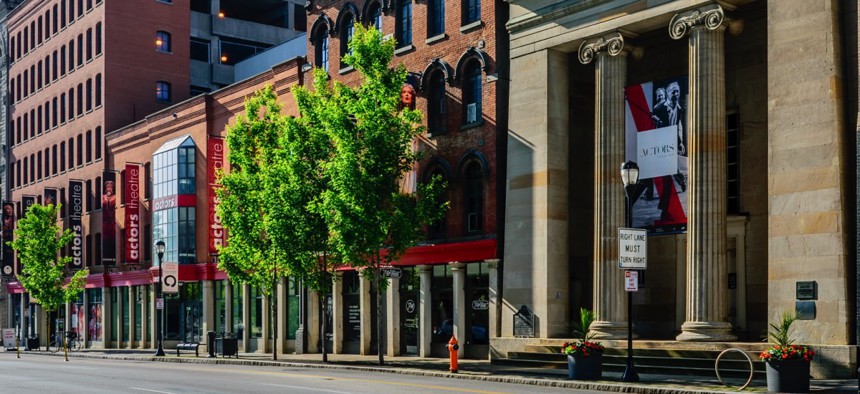‘Resilient Cities’ Look to Address Social Inequality as a Function of Other Environmental, Economic Stresses

Louisville, Kentucky
Louisville, Kentucky, sees a link between its most pressing problems and poorest neighborhoods, and it’s not alone.
WASHINGTON — While Greg Fischer, the mayor of Louisville, Kentucky, accepted his city's admittance into the 100 Resilient Cities network on Wednesday in the nation's capital, another organization, Living Cities, was simultaneously naming his city one of its Racial Equity Here flagships in New York City.
The significance wasn’t lost on the mayor, who said there’s a method to the grants Louisville pursues.
Poor air quality and the urban heat island effect, two of the city’s biggest resilience challenges, both occur in its poorest neighborhoods.
“Obviously there’s a natural synergy between social mobility and income inequality,” Fischer told Route Fifty in an interview. “There’s a correlation between our environmental stresses and the geographic locations of our lower-income populations.”
A $164 million effort, 100RC grants member cities the funds to hire a chief resilience officer to help formulate a resilience strategy. Louisville will meet with four or five such CROs to develop a robust job description, Fischer said, preferring someone with a working knowledge of environmental, economic development and emergency response issues.
While it’s too early to say which problems will take precedence, AIR Louisville is already beginning to address the city’s high asthma rates by outfitting inhalers with free sensors—tracking use to geocode air quality emergencies—and greening neighborhoods to purify air. And the Urban Heat Island Project has found that one part of Louisville, the less-vegetated part, is about 10 degrees hotter on average.
Flash flooding is another challenge, one that can overwhelm the city’s sewer infrastructure, but 100RC—having established all 100 of its member municipalities—can now move on to the business of helping them “steal” each other’s best practices.
“There hasn’t been a site that has [an issue] nobody else has, so maybe that’s been the biggest insight,” Judith Rodin, president of The Rockefeller Foundation, which launched 100RC in 2013, said in an interview.
About 90 percent of resilience priorities have been water-related, she said, addressing too much, too little or poor sanitation.
Social inequality has proven to be the second-most common problem.
In one “resilient city,” New Orleans, about 50 percent of African American residents are unemployed, Rodin said. So the city developed a resilience strategy encompassing economic development, neighborhood revitalization, crime reduction and flood control that incorporated funding for job training.
Washington, D.C., was also announced as one of the final 37 resilient cities on Wednesday—a city that’s seen an international terrorist attack on the Pentagon, domestic mass shooting at the Washington Navy Yard and severe weather like derechos in recent years. Mayor Muriel Bowser also counted climate change, cyber threats and socioeconomic conditions among her top concerns during Wednesday's National Press Club presentation.
Currently with a population around 700,000 residents, the District of Columbia is projected to have nearly 1 million residents within 30 years—a population it hasn’t seen since the 1950s. That means more regional stresses.
“As mayors we wake up everyday knowing anything can happen,” Bowser said, urging her colleagues to “prepare for all eventualities.”
New resilient city Nashville has a low unemployment rate of 3.1 percent, but the same isn’t true of its African American population. Social justice, transportation mobility and flood mitigation are high on Mayor Megan Barry’s to-do list with the city poised to see $3.6 billion in investment this year.
“We are a city on the rise,” Barry said.
Platform partners of 100RC, whose support is valued in excess of $200 million, will assist these cities and the 97 others as they begin to implement their resilience strategies.
Waiting around to be chosen by a network like 100RC is a mistake—Louisville not being selected until its second try, Fischer said.
Cities outside the network have already started appoint their own chief resilience officer, which points to the national conversation 100RC is generating, Rodin said.
“We’ll bring them into the network right away because it makes sense,” she added.
Dave Nyczepir is a News Editor at Government Executive’s Route Fifty.
NEXT STORY: Sharing data both down the hall and across the state






